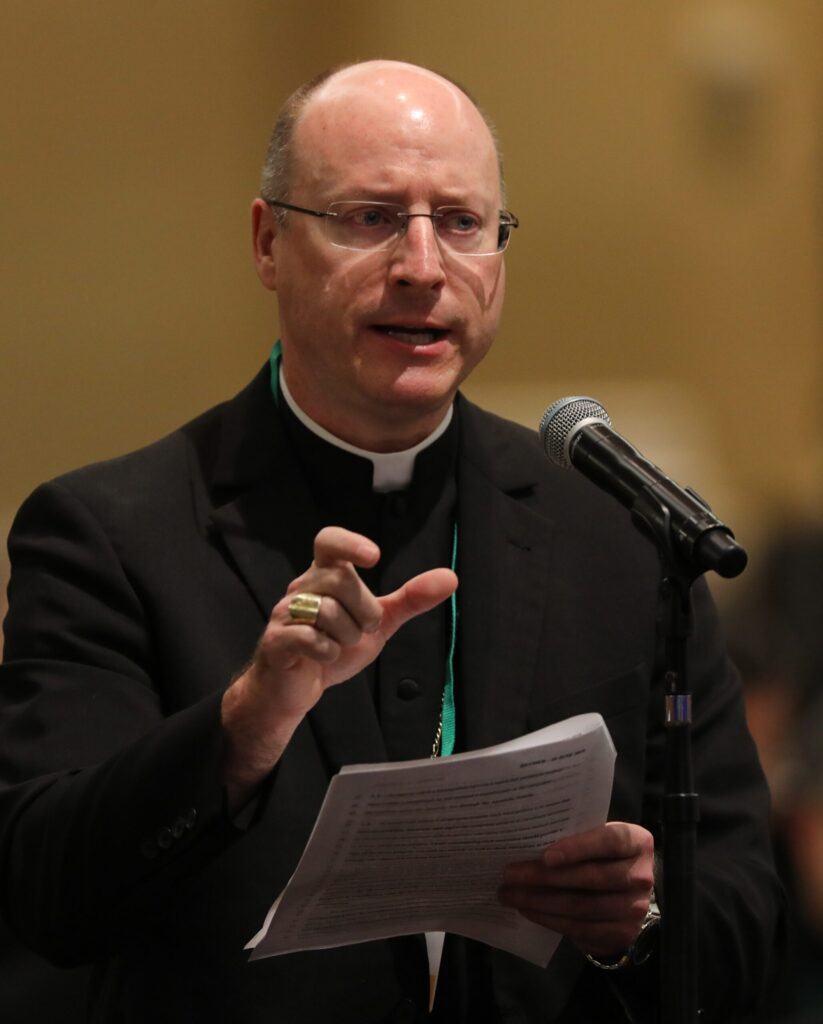Deacons feel ‘seen’ by Archbishop McKnight
Bishop W. Shawn McKnight of Jefferson City, Mo., speaks from the floor on the first day of the spring general assembly of the U.S. Conference of Catholic Bishops in Baltimore June 11, 2019. CNS PHOTO/BOB ROLLER
by Tom Hoopes
Special to The Leaven
ATCHISON — Deacons in northeast Kansas have a special reason to be grateful for the archdiocese’s new leader: He is regarded as one of the nation’s foremost scholars of the diaconate.
Just ask the best-known deacons in America.
Deacon Greg Kandra, an award-winning journalist and author who created the blog “The Deacon’s Bench” told The Leaven that “Archbishop McKnight is unique among American bishops,” having devoted hours to the diaconate as “a serious ministry deserving of serious study.”
Deacon Bill Ditewig, author of “Courageous Humility: Reflections on the Church, Diakonia and Deacons,” told The Leaven that Archbishop McKnight’s “views are particularly valuable because they are well-researched, moderate and balanced.”
Deacon Leon Suprenant, director of the archdiocesan office of the permanent diaconate, is another nationally known deacon.
He said Archbishop McKnight “is one of the very few ‘experts’ in the field. And it is huge and exciting — and scary! — for me . . . to have a bishop who obviously is interested in — and so knowledgeable about — the permanent diaconate.”
Archbishop McKnight’s doctoral dissertation was a deep dive into the theology, history and current status of the diaconate. He has taught classes on the subject at the Pontifical College Josephinum in Ohio and at St. Meinrad Seminary in Indiana.
“He also gained valuable practical experience on the diaconate when he headed the Secretariat of Clergy, Consecrated Life and Vocations for the U.S. bishops, said Deacon Ditewig, who is the former executive director of the U.S. bishops’ Secretariat for the Diaconate. In Washington, Deacon Ditewig found Archbishop McKnight to be “a wonderful collaborator, with a great sense of humor, and passionate about ministry and giving our best to the people we serve.”
Archbishop McKnight published “Understanding the Diaconate” in 2018.
“The book significantly contributes to the literature on the diaconate, by providing a clear foundation for the deacon’s function — based on history, theology, sociology and pastoral ministry,” said theologian Ella Johnson at St. Ambrose University in Davenport, Iowa, in a review. “It should be required for every ordained deacon and those in formation.”
In the book, Archbishop McKnight wrote: “The deacon’s role cannot be reduced to a simple set of tasks, whether charitable or liturgical.”
He wrote that the deacon lives in the tension between his role as representative of both the informal church community (“communitas”) and of the formal, ecclesial, structure of the church. Archbishop McKnight sees the “parable-in-action” of the Last Supper an icon of the deacon’s role.
Deacons, for their part, feel “seen” by Archbishop McKnight.
“There is a distinctive identity to the diaconate which Archbishop McKnight deeply understands and appreciates,” said Deacon Suprenant. “We are neither ‘priests lite’ nor a ‘fifth-degree Knights of Columbus,’ but ‘servants on the move,’ bringing the grace of holy orders to those on the peripheries or ‘thresholds’ — to those generally beyond the reach of the priests and parish structures.”
“He ‘gets’ us,” agreed Deacon Kandra. “He has remembered more history of the diaconate than most of us have forgotten. He knows the ancient roots of the diaconate. His scholarship is amazing — I think he dreams in Greek — and he clearly wants to make the diaconate vital and vibrant in parishes today.”
Deacon Stan Sluder serves at St. Benedict Parish in Atchison, where he is executive vice president of Benedictine College, overseeing the college’s new medical school project. He has been a deacon in Kansas for two years, after being ordained in the Archdiocese of Santa Fe.
Deacon Sluder says Archbishop McKnight’s emphasis on the deacon’s role outside the liturgy is key.
“There are many ways to accomplish what I do in the liturgy,” he said. “It is the work in the prison and the nursing homes that is my most important contribution. There is not a long line of people waiting to do what I do in the prison.”
More than that, he said, “When I show up at a nursing home as a layperson, it is just me showing up, and that’s a great service to the people. But, as they taught us in formation, after you are ordained, when you show up, it is the whole church that shows up for those people.”
Deacon Kandra said time will tell how the diaconate will develop.
At a New Orleans diaconal congress in 2018, marking 50 years since the permanent diaconate was restored in 1968, Archbishop McKnight shared words Deacon Kandra and other deacons in the audience haven’t forgotten.
“If you get the diaconate right,” he said, “everything else just falls into place.”
Archbishop McKnight “realizes that the modern diaconate is very much a work in progress, and it will take decades, maybe centuries, before the vision of Vatican II is fully realized,” Deacon Kandra said.
Deacon Suprenant agreed.
“We still have a ways to go in practice,” he said, “but he sees all this and will encourage our deacon community as we develop.”

No comments:
Post a Comment